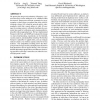Free Online Productivity Tools
i2Speak
i2Symbol
i2OCR
iTex2Img
iWeb2Print
iWeb2Shot
i2Type
iPdf2Split
iPdf2Merge
i2Bopomofo
i2Arabic
i2Style
i2Image
i2PDF
iLatex2Rtf
Sci2ools
NSDI
2008
2008
Passport: Secure and Adoptable Source Authentication
We present the design and evaluation of Passport, a system that allows source addresses to be validated within the network. Passport uses efficient, symmetric-key cryptography to place tokens on packets that allow each autonomous system (AS) along the network path to independently verify that a source address is valid. It leverages the routing system to efficiently distribute the symmetric keys used for verification, and is incrementally deployable without upgrading hosts. We have implemented Passport with Click and XORP and evaluated the design via micro-benchmarking, experiments on the Deterlab, security analysis, and adoptability modeling. We find that Passport is plausible for gigabit links, and can mitigate reflector attacks even without separate denial-of-service defenses. Our adoptability modeling shows that Passport provides stronger security and deployment incentives than alternatives such as ingress filtering. This is because the ISPs that adopt it protect their own addresse...
Adoptability Modeling | Computer Networks | NSDI 2008 | PASSPORT | Separate Denial-of-service Defenses |
Related Content
| Added | 02 Oct 2010 |
| Updated | 02 Oct 2010 |
| Type | Conference |
| Year | 2008 |
| Where | NSDI |
| Authors | Xin Liu, Ang Li, Xiaowei Yang, David Wetherall |
Comments (0)

